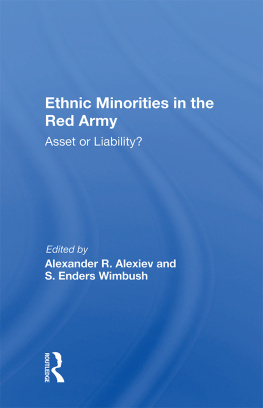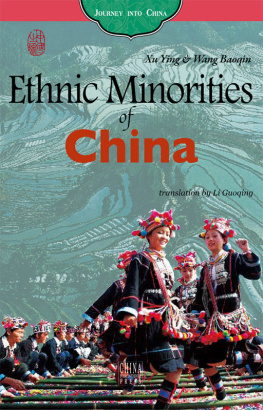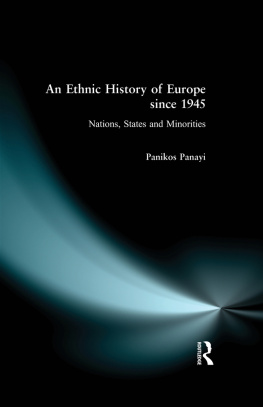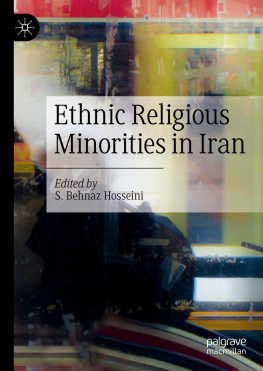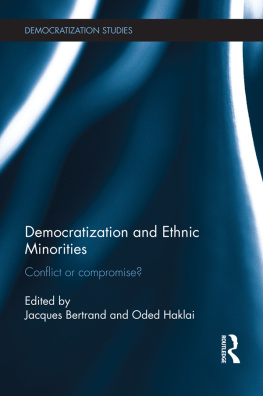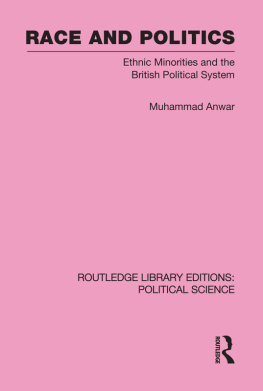First published 1988 by Westview Press
Published 2018 by Routledge
52 Vanderbilt Avenue, New York, NY 10017
2 Park Square, Milton Park, Abingdon, Oxon OX14 4RN
Routledge is an imprint of the Taylor & Francis Group, an informa business
Copyright 1988 by The RAND Corporation
All rights reserved. No part of this book may be reprinted or reproduced or utilised in any form or by any electronic, mechanical, or other means, now known or hereafter invented, including photocopying and recording, or in any information storage or retrieval system, without permission in writing from the publishers.
Notice:
Product or corporate names may be trademarks or registered trademarks, and are used only for identification and explanation without intent to infringe.
Library of Congress Cataloging-in-Publication Data
Ethnic minorities in the Red Army.
(A RAND Corporation research study)
Bibliography: p.
Includes index.
1. Soviet UnionArmed ForcesMinorities.
I. Alexiev, Alexander R. II. Wimbush, S. Enders. III. Series.
UB419.S65E84 1988 355'.00947 87-21590
ISBN 13: 978-0-367-01414-8 (hbk)
The national diversity of Soviet military manpower has always been one of the most important factors affecting our estimates of the Soviet armed forces, particularly their morale, effectiveness, and reliability. In this book, finally, this issue is treated with the thoroughness and scope it deserves.
The military side of this problem is, of course, of great importance to all concerned with the defense of the West. Yet although this book addresses itself specifically to nationality issues as they affect the armed forces, it holds much broader interest. What happens in the armed forces is, needless to say, a reflection of a problem that is deeply rooted in the whole Soviet social and political order.
The authors make it clear, in the historical section of the book which deals with the old Russian Empire's problems in the field, that these problems are not new. Moscow now directly rules an area which, with a few exceptions, is roughly the same as that Empire. Its geopolitical stance is the same as that of the Empire. It conquered and, as it were, reconquered the Ukraine, Transcaucasia, Central Asia, and later the Baltic States, with largely Russian armies, sent in from Russia. And it relies, to an overwhelming extent, on the Russian nation, and on Russian patriotism. But at the same time, the Soviet Union claims to be something differentan international, or supranational, entity. Only thus, or so it believes, can it obtain the loyalty of the non-Russian nations.
But this is an anomalous position. Soviet theorists frequently speak of an eventual gathering in, or merging, of these nations into one nation, with Russian as its language. Every time they speak, or act, to this theme, they naturally arouse resistance. Half the population is non-Russian, and it is hard work to create a "Soviet patriotism" in the absence of a genuine Soviet patria.
The Union of Soviet Socialist Republics is the only country in the world that has no national or geographical reference whatever in its name. The word "Soviet," which is commonly used in lieu of a national designationas in "the Soviet people"simply means "Council." It refers to the original Council of Workers' (and Soldiers' and Peasants') Deputies of the revolutionary period. After the seizure of power, the state was supposedly organized on the basis of these bodies, "elected" at the place of work (though, of course, the real power remained, as it does to this day, with the Communist party and its apparatus). In 1937, the new Constitution changed even the forms: Soviets were now "elected" on a regional basis, with local constituencies, exactly as in the West. The term "Soviet" thus ceased to have any distinctive meaning at all.
The USSR is, in fact, a purely political appellationand an obsolete one, at thatbased on an accident of history. The creation of an artificial patriotism has always been a particularly refractory problem for the Kremlin, since such patriotism contains a contradiction in terms. The Soviet leadership has always been attracted to an overt Russian nationalism, with its appeal at least to Russians; but it is always forced back into the pretense of a loyalty transcending such nationalism, to placate or at least neutralize, the lesser nationalities.
How this effort has worked, what effect it has had, is having, and may have in the future, at a time when both Russian nationalism and non-Russian nationalism are showing themselves stronger than Soviet ideology, is a crucial issue. The military aspect is, of course, at once striking and significant; and here the authors have made a quite unprecedented contribution to our understanding. But the national problem is also a central one for the USSR in a broader political context; and here, too, although that was not their immediate aim, the authors have provided information and discussion that are highly illuminating and will be vital to anyone interested in the USSR as it is today.
Robert Conquest
Hoover Institution
Stanford, California
Over the years, Western students of Soviet military affairs have painstakingly researched and analyzed most of the important aspects of Soviet military doctrine and capabilities. Studies are available on the Soviet operational art, tactical and strategic doctrine, weapon systems design and capabilities, and organizational principles. With some exceptions, information in these areas has become quite extensive. There are, however, some important aspects of Soviet military power that remain largely unexplored. Most of these involve factors that significantly affect overall Soviet force effectiveness, yet because these factors are generally subjective and very little reliable information is available from traditional sources, researching them can present nearly insurmountable problems for the Western analyst. Of these factors, the "human element" in the Soviet military has perhaps received the least sustained or systematic attention. This has led to serious gaps in analytical assessments of the Soviet armed forces, inasmuch as any army is at bottom only as good as the men who fight in it.
One of the key aspects of the "human element" that is often ignored in research on the Soviet military is the ethnic factor and its implications for Soviet operational capabilities and strategic planning. While this may appear to be a logical result of the scarcity of relevant informationexcept, of course, at the propaganda levelin the Soviet media and specialized literature, there certainly is no lack of historical justification for studying the ethnic factor with considerable vigor. Multinationalism and the difficulties that can arise from it are not unique to today's Soviet military; indeed, they have been a prominent feature of imperial military machines for centuries. While we would not wish to imply that nothing has changed since the days of Frederick the Great or Suleiman the Magnificent, even the most cursory investigation of ethnic problems in the Soviet armed forces indicates that Soviet authorities are in fact wrestling with the same kinds of ethnicity-related dilemmas that have vexed famous commanders in the past and have strained some of the most formidable armies, including the Austro-Hungarian and the Ottoman, at times to the breaking point. Armies, especially large armies, nearly always represent complex social environments in which differences among soldiers, particularly ethnic differences, must be kept under control. At best, multinationalism can be harnessed for concerted action, even strategic advantage; at worst, it can be the source of serious disruption.


